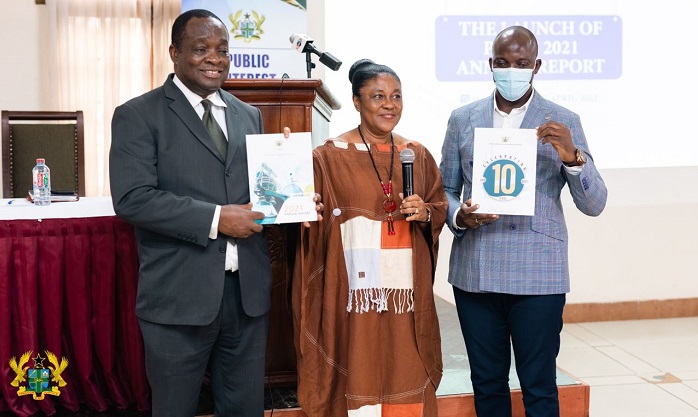
The Public Interest Accountability Committee (PIAC) has advised the Ghana National Petroleum Corporation (GNPC) to stop granting loans to government, until a large portion of $318.09 million debt it owes is paid.
This follows the inability of the GNPC to realise its 2021 budgeted revenue from loans and guarantees of $126.68 million out of the accumulated debt owed the corporation by government and its agencies since 2011.
PIAC urged GNPC to double efforts at recovering loans to government and its agencies, to ensure that the corporation’s programmes did not suffer from non-implementation.
This recommendation was captured in PIAC’s Annual Report on the management and use of petroleum revenues for 2021, which was launched in Accra, yesterday.
The release of the 11th annual report is in fulfilment of Section 56 of the Petroleum Revenue Management Act (PRMA), 2011 (Act 815), which mandates PIAC to monitor and evaluate the management and use of Ghana’s petroleum revenue by the government and stakeholder institutions.
The report also indicated that as at the end of December 2021, GNPC had still not received payment of $50 million advanced to the Ministry of Finance (MoF) in 2014, for the construction of the Western Corridor roads, in the Atuabo Gas Processing Plant enclave, which was supposed to be paid in three months.
In the same year under review, the report said, the corporation spent $640,292.89 on the Maritime Boundary Special Project, resulting in cumulative expenditure of $11.85 million on maritime boundary-related activities, even though the Ghana Boundary Commission was responsible for such activities.
“GNPC’s recurring expenditure on the Maritime Boundary Dispute and its related activities continues to raise issues with the corporation’s institutional roles and responsibilities”, the report said.
Presenting highlights of the report, the PIAC Chairman, Professor Kwame Adom-Frimpong, said for the first time since Ghana started receiving petroleum revenue in 2011, the District Assembly Common Fund (DACF), received GH¢32 million, following the 2019 decision of the Supreme Court in the case of Kpodo versus The Attorney-General.
However, he said, the disbursement made was 1.74 per cent of the ABFA, instead of the five per cent specified in the Supreme Court judgement and to this, the PIAC recommended that the judgement be implemented in full.
Prof. Adom-Frimpong said although the MoF made a disbursement of the Annual Budget Funding Amount (ABFA) to the DACF, there was no report on the utilisation of the amount.
On annual crude oil production, Prof. Adom-Frimpong said declined by 17.7 per cent from 66,926,806 barrels (bbls) in 2020 to 55,050,391 bbls in 2021, despite the rebound of economic activities in 2021, after the easing of COVID-19 restrictions.
That notwithstanding, he said, the total petroleum revenue increased by 17.5 per cent from $666 million in 2020 to US$783 million in 2021, due to higher crude oil prices.
A founding member of PIAC, Mrs Angela Peasah, who chaired the launch, urged the committee to consider including other areas like sustainable development goals in its deliberations on oil revenue use and management.
BY JONATHAN DONKOR







